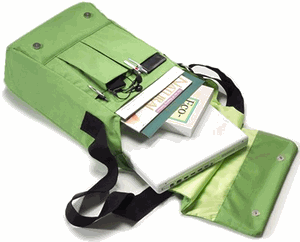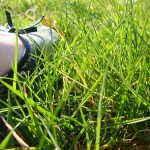
This plastic-free February thing got me thinking . . . oh no . . . last week, I was contemplating how much plastic there is in my life, but also noted how much progress I have made in not only reducing new plastic intake, but in using products made from recycled plastic and rPET (polyester made from recycled plastic bottles).
I debated whether these products, like my favorite computer bag in the picture above, were really ‘bad’. Are all forms for plastic, recycled, reused and repurposed so evil?
Then in preparation for an interview with Jurriaan Kamp, founder and publisher of Ode Magazine, I found a recent article in Ode called Plastic Fantastic. I’d like to think writer Andrew Tolve was writing this article for me personally, but I seriously doubt it because he doesn’t know I exist. As soon as I saw the title and the brief description, I knew I had stumbled on to a potential point of view that might help reconcile my feelings about this plastic mess. The subtitle got me: Want to clean up the environment? Learn to love plastic.
The article articulates and validates a lot of what I was thinking – that it is totally unrealistic to think we will ever go back to a world without plastic (if only because most plastic will hang around for another thousand years or so). However, if we are judicious in our use of plastic and responsible in how it is manufactured and disposed of, perhaps there is a way to moderate and co-exist with some plastic in this world.
As Jurriaan Kamp suggested in our interview last night, can we really create the innovation and technology we need to promote a healthy economy and even ultimately a healthier environment without the use of at least some plastic?
Like so many other environmental issues and hazards, it is going to be a matter of growing awareness and a weaning from excessive use and abuse of the substance. Perhaps a transition to reduction of newly made plastics, an increase in new technologies that allow for recycling of old plastic into new plastic without the use of any new materials, such as my awesome bag pictured above, which is made by a company called GreenSmart and is made entirely from rPET material derived from plastic bottles.
I would also like to see more of the bioplastics that can be produced without the use of petroleum and that do biodegrade eventually – keeping an eye on the entire product life cycle from manufacturing to reuse to ultimate disposal. I think the more we can recycle and reuse the old un-biodegradable stuff, the better.
If you have a few minutes, I highly recommend reading the Ode article as it is well documented and cites a variety of companies that are bringing about innovative technology for more responsible use of the inevitable plastic we are not likely to live without for now.

